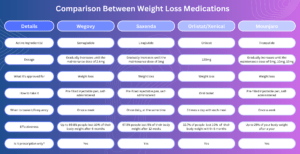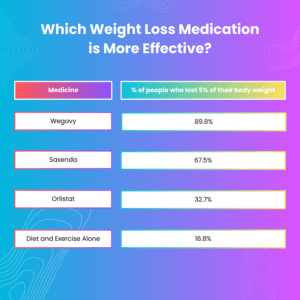According to UK Health Media, Obesity is a big problem for the NHS in the UK, costing them about £6.5 billion every year. It’s also the second leading cause of cancer that can be prevented. In England, more than one in four adults (26%) and nearly a quarter of children aged 10-11 (23.4%) have obesity.
Sometimes, people struggle to lose weight even with a healthy diet and exercise. They often have trouble controlling their hunger due to various reasons. That’s why healthcare professionals prescribe weight loss medications to treat obesity along with a calorie deficit diet.
In this blog, you will learn about the top-trending weight loss medications in the UK, insights into their effectiveness and safety, and how they can help you in your weight loss journey.
Understanding Weight Loss Medications
Weight loss medications are not just supplements; they are scientifically formulated drugs designed to treat chronic weight management. These medications work through various mechanisms, such as suppressing appetite, increasing metabolism, or preventing fat absorption.

How Do Weight Loss Medications Work?
These medications control hormones in the brain, gut, and fat cells to reduce hunger and cravings and make you feel full.
Research indicates that weight loss medicines are only effective when combined with the proper lifestyle adjustments while supported by qualified healthcare professionals.
You can take some as pills or get them as injections under the skin. When people ask about weight-loss pills versus injections, they’re usually talking about two ways to take GLP-1 RAs. In May 2023, Novo Nordisk and Pfizer announced that pills and injections work equally well.
Top Trending Weight Loss Medications in 2024

1. Wegovy (Semaglutide)
Wegovy is a brand name for the prescription medication Semaglutide, primarily used for weight management in adults. It belongs to a class of drugs known as GLP-1 receptor agonists.
How Does Wegovy Work for Weight Loss?
Here’s how Wegovy works for weight loss:
Appetite Suppression: Wegovy works by mimicking a hormone called glucagon-like peptide-1 (GLP-1) that targets areas of the brain that regulate appetite and food intake. Doing so helps reduce hunger and increase feelings of fullness, leading to a reduced calorie intake.
Slowing Gastric Emptying: The medication can slow down the emptying of the stomach, contributing to increased satiety and reduced food consumption.
Impact on Blood Sugar Levels: Although primarily used for weight loss, Wegovy also affects blood sugar control. It helps lower blood sugar levels, benefiting individuals with type 2 diabetes.
Dosage and Administration: Wegovy is usually administered as a once-weekly injection under the skin (subcutaneous injection). The dose may be gradually increased over time to improve tolerability and effectiveness.
Clinical Trials and Effectiveness: Clinical trials have shown that Wegovy can lead to significant weight loss when combined with diet and exercise. The amount of weight loss varies among individuals.
How to Use Wegovy?
Wegovy is a once-a-week injection that you can administer yourself under the skin, either in your abdomen, thigh, or upper arm. You should take it on the same day every week; it doesn’t matter if you’ve eaten.
Your healthcare provider will tell you how to give yourself the injection at home, making it more convenient for you.
Usually, the injection doesn’t hurt much because it’s injected with a very fine needle.
Is it safe to use Wegovy for weight loss?
It is important to note that Wegovy is a prescription-only medicine. It is usually prescribed to individuals with a body mass index (BMI) of 30 or higher (obese) or 27 or higher (overweight) with at least one weight-related condition such as high blood pressure, type 2 diabetes, or high cholesterol.
Is Wegovy Available in the UK?
Wegovy is licensed for weight loss and manufactured by Novo Nordisk. It was approved by the UK Medicines and Health products Regulations Agency (MHRA) in September 2021 and became available from September 4, 2023.
Wegovy available dosages:
- Wegovy 0.25 mg
- Wegovy 0.5 mg
- Wegovy 1 mg
- Wegovy 1.7 mg
- Wegovy 2.4 mg
Book an online consultation with one of our experts and your Wegovy weight loss injection will be delivered at your door step.
Common Side Effects of Wegovy
The most frequent side effects of Wegovy relate to the stomach and include nausea, diarrhoea, vomiting, constipation, and stomach pain. For most individuals, these stomach-related side effects reduce or disappear within a few weeks of starting the treatment.
Does Wegovy Cause Hair Loss?
Health experts suggest that hair loss observed in patients taking Wegovy might not directly result from the medication. Instead, it could be a response to the rapid weight loss and reduced caloric intake, which the body interprets as a stressor, leading to a shift in hair growth cycles and hair loss.
2. Mounjaro (Tirzepatide)
Mounjaro is a newly launched weight loss medication, manufactured by Eli Lilly. It is a once-weekly injection that contains an ingredient called Tirzepatide.
It is a dual glucose-dependent insulinotropic polypeptide (GIP) and glucagon-like peptide-1 (GLP-1) receptor agonist. It works by mimicking the action of these incretin hormones, which play a key role in regulating blood sugar levels and appetite. Here’s how it contributes to weight loss
Appetite Suppression: Mounjaro helps reduce appetite by affecting the brain’s hunger centres, leading to reduced calorie intake.
Delayed Gastric Emptying: It slows down the emptying of the stomach, which makes you feel full for longer periods.
Enhanced Insulin Sensitivity: By improving how the body uses insulin, Mounjaro helps in better blood sugar control, which can contribute to weight management.
Increased Energy Expenditure: Some studies suggest that Mounjaro may increase the body’s energy expenditure, helping burn more calories.
Benefits of Mounjaro
Significant Weight Loss: Clinical trials have shown that Mounjaro can lead to substantial weight loss of 20% in individuals having a BMI of 30
Improved Glycaemic Control: It helps in achieving better blood sugar levels, which is beneficial for overall health.
Cardiovascular Benefits: Mounjaro may have positive effects on cardiovascular health, reducing the risk of heart disease.
Convenient Dosing: It is administered once weekly, making it a convenient option for many patients.
Potential Side Effects
While Mounjaro is generally well-tolerated, some individuals may experience side effects, including:
Gastrointestinal Issues: Nausea, vomiting, and diarrhoea are the most common side effects.
Hypoglycaemia: When used with other diabetes medications, there is a risk of low blood sugar.
Injection Site Reactions: Redness or discomfort at the injection site.
Pancreatitis: There is a potential risk of pancreatitis, though this is rare.
3. Saxenda (Liraglutide)
Saxenda represents a significant advancement in medical weight loss solutions. As an MHRA-approved injection, it offers a novel approach to managing obesity and related health issues.
Saxenda’s active ingredient, Liraglutide, is a GLP-1 receptor agonist. This section delves into how liraglutide interacts with the body to aid weight loss and other ingredients that support its efficacy.
How Does Saxenda Work for Weight Loss?
Saxenda helps you lose weight by making you feel less hungry and fuller for longer. It slows down how quickly your stomach empties, so you end up eating less. It works like a natural hormone in your body that helps manage your blood sugar, insulin, and digestion.
Usage & Dosage
Saxenda is administered as a once-daily subcutaneous injection, typically in the thigh, abdomen, or upper arm. The dosage usually starts from 0.6 mg and gradually increases to 3mg to minimise side effects. Patients must follow the dosage instructions given by healthcare providers to achieve optimal results.
Effectiveness
Clinical trials have shown that Saxenda, when used alongside a reduced-calorie diet and increased physical activity, can lead to significant weight loss. Many users experience more pronounced weight loss in the first few months of treatment.
4. Orlistat Capsules
Orlistat capsules have emerged as a popular and effective solution for weight management. Known for its unique mechanism of action, Orlistat offers a clinically proven method to aid in weight loss.
How Does Orlistat Help with Weight Loss?
Orlistat functions by inhibiting the action of lipase, an enzyme responsible for breaking down dietary fats in the intestine. This inhibition prevents the absorption of about one-third of the fat consumed in your diet, leading to its excretion rather than storage.
The reduction in fat absorption is a key factor in weight loss with Orlistat. Limiting the number of calories your body absorbs, Orlistat promotes a caloric deficit, which is essential for weight loss.
How much weight will I lose with Orlistat?
Research has found that combining Orlistat with a diet and exercise aimed at losing weight typically leads to more weight loss than just dieting and exercising. In fact, some individuals shed over 10% of their body weight within six months using Orlistat.
Dosage and Administration Guidelines
Recommended Dosage
The standard dose of Orlistat is 120 mg three times a day, taken with each main meal containing fat. It’s important to adhere to the recommended dosage for optimal results.
Best Practices for Taking Orlistat
Taking Orlistat alongside a balanced, low-fat diet enhances its efficacy. Patients are advised to monitor their diet to maximize the benefits.
Potential Side Effects and Precautions
While Orlistat is generally well-tolerated, it can cause gastrointestinal side effects due to unabsorbed fats. These effects are usually temporary and manageable.
Managing and Minimising Side Effects
Adhering to a low-fat diet can significantly reduce the likelihood of experiencing side effects. Consultation with a healthcare provider is recommended for managing any persistent issues.

FAQs
What is the most effective weight loss medication?
Clinical studies have shown that 89.8% of people have lost 5% of their body weight with Wegovy weight loss injections. Hence, Wegovy is the most successful weight loss medicine so far.
When is the best time to take Wegovy?
Wegovy should be taken once a week on the same day each week at any time of the day. You may change the day of the week you take Wegovy as long as your last dose was given 2 or more days before.
At what dose Wegovy starts working?
Everyone’s body reacts differently to the weight loss medications. However, you’ll start seeing results within 4 weeks of treatment. The starting dose of Wegovy is 0.25mg and you’ll gradually increase the dose to 1.7mg and 2.4 mg.
How long it takes to lose weight on Wegovy?
Clinical trials have shown that Wegovy can lead to a weight loss of around 16% of your body weight, or 16-17 kg, after 68 weeks.
Where can I find Wegovy in stock?
Wegovy is currently in stock at The Care Pharmacy in the UK. All the Wegovy strengths are available at our online pharmacy in Bradford and Leeds.
Who cannot take weight loss medications?
- Pregnant women
- Breastfeeding mothers
- Individuals with a BMI < 27
- People with a history of eating disorders
What is the best alternative to Wegovy?
Following are the alternatives to Wegovy:
- Saxenda
- Orlistat
Can I switch from Saxenda to Wegovy?
Suppose you’re currently using Saxenda and are considering switching to Wegovy. In that case, you should discuss it with your GP, medication provider, or healthcare professional first. Saxenda is a daily injection, and Wegovy is administered once a week.
What is the cost of Wegovy in the UK?
The cost of Wegovy depends on its strengths. It starts from £199 and reaches up to £299.
How long does Wegovy stay in your body?
The active ingredient in Wegovy i.e. Semaglutide, has a relatively long half-life, and It stays in your body for about 7 days. However, the duration of Wegovy remains in your system depends on many factors, including the dose of Wegovy you’re on, how long you’ve used it, and even your BMI.
